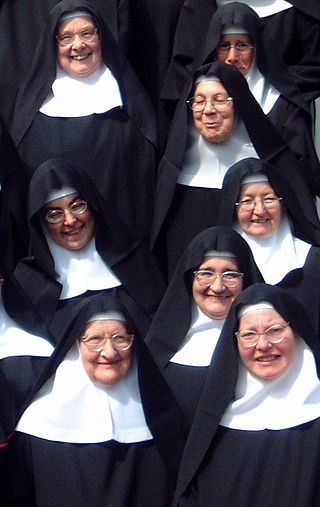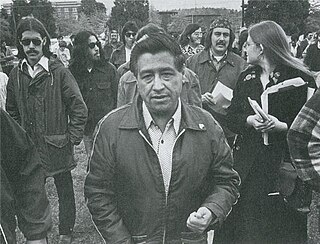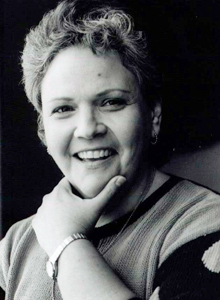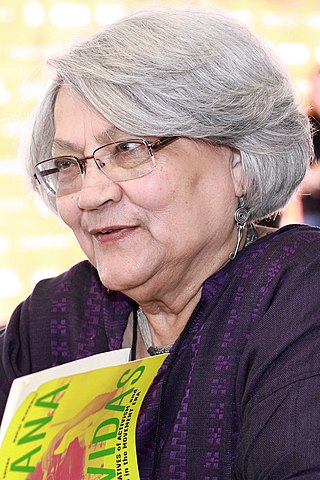Related Research Articles

Chicano or Chicana is an ethnic identity for Mexican Americans who have a non-Anglo self-image, embracing their Mexican Native ancestry. Chicano was originally a classist and racist slur used toward low-income Mexicans that was reclaimed in the 1940s among youth who belonged to the Pachuco and Pachuca subculture. In the 1960s, Chicano was widely reclaimed in the building of a movement toward political empowerment, ethnic solidarity, and pride in being of indigenous descent. Chicano developed its own meaning separate from Mexican American identity. Youth in barrios rejected cultural assimilation into whiteness and embraced their own identity and worldview as a form of empowerment and resistance. The community forged an independent political and cultural movement, sometimes working alongside the Black power movement.

A nun is a woman who vows to dedicate her life to religious service and contemplation, typically living under vows of poverty, chastity, and obedience in the enclosure of a monastery or convent. The term is often used interchangeably with religious sisters who do take simple vows but live an active vocation of prayer and charitable work.

Tejanos are the residents of the state of Texas who are culturally descended from the Mexican population of Tejas and Coahuila that lived in the region prior to it becoming what is now known as the state of Texas before it became a U.S. state in 1845. The term is also sometimes applied to all Texans of Mexican descent.

The Comisión Femenil Mexicana Nacional was a Mexican-American organization dedicated to economically and politically empowering Chicana women in the United States.

The Chicano Movement, also referred to as El Movimiento, was a social and political movement in the United States that worked to embrace a Chicano/a identity and worldview that combated structural racism, encouraged cultural revitalization, and achieved community empowerment by rejecting assimilation. Chicanos also expressed solidarity and defined their culture through the development of Chicano art during El Movimiento, and stood firm in preserving their religion.

Chicana feminism is a sociopolitical movement, theory, and praxis that scrutinizes the historical, cultural, spiritual, educational, and economic intersections impacting Chicanas and the Chicana/o community in the United States. Chicana feminism empowers women to challenge institutionalized social norms and regards anyone a feminist who fights for the end of women's oppression in the community.
Las Adelitas de Aztlán was a short-lived Mexican American female civil rights organization that was created by Gloria Arellanes and Gracie and Hilda Reyes in 1970. Gloria Arellanes and Gracie and Hilda Reyes were all former members of the Brown Berets, another Mexican American Civil rights organization that had operated concurrently during the 1960s and 1970s in the California area. The founders left the Brown Berets due to enlarging gender discrepancies and disagreements that caused much alienation amongst their female members. The Las Adelitas De Aztlan advocated for Mexican-American Civil rights, better conditions for workers, protested police brutality and advocated for women's rights for the Latino community. The name of the organization was a tribute to Mexican female soldiers or soldaderas that fought during the Mexican Revolution of the early twentieth century.
Virgilio P. Elizondo was a Mexican-American Catholic priest and community activist, who was also a leading scholar of liberation theology and Hispanic theology. He was widely regarded as "the father of U.S. Latino religious thought."

Ada María Isasi-Díaz was a Cuban-American theologian who served as professor emerita of ethics and theology at Drew University in Madison, New Jersey. As a Hispanic theologian, she was an innovator of Hispanic theology in general and specifically of mujerista theology. She was founder and co-director of the Hispanic Institute of Theology at Drew University until her retirement in 2009.

Martha P. Cotera is a librarian, writer, and influential activist of both the Chicano Civil Rights Movement and the Chicana Feminist movement of the 1960s and 1970s. Her two most notable works are Diosa y Hembra: The History and Heritage of Chicanas in the U.S. and The Chicana Feminist. Cotera was one of six women featured in a documentary, Las Mujeres de la Caucus Chicana, which recounts the experiences of some of the Chicana participants of the 1977 National Women's Conference in Houston, Texas.

Chicana literature is a form of literature that has emerged from the Chicana Feminist movement. It aims to redefine Chicana archetypes in an effort to provide positive models for Chicanas. Chicana writers redefine their relationships with what Gloria Anzaldúa has called "Las Tres Madres" of Mexican culture by depicting them as feminist sources of strength and compassion.
Hijas de Cuauhtémoc was a student Chicana feminist newspaper founded in 1971 by Anna Nieto-Gómez and Adelaida Castillo while both were students at California State University, Long Beach.

Delia Villegas Vorhauer was an American Latina social worker, who successfully ran programs to assist the Hispanic communities in Illinois, Ohio and Michigan. She was awarded a presidential medal for her efforts in development. She founded Mujeres Unidas de Michigan as an advocacy group for Spanish-speaking women and as a result of their activism the group sent six delegates to the 1977 National Women's Conference, which was a part of the UN International Women's Year programs. Vorhauer served as vice chair of the delegation to the conference. She authored the Mason Miller Report, an evaluation of minorities and higher education, which became the model for analyzing participation of minorities in colleges and universities throughout Michigan, leading to a state bi-lingual education law. When she lost her sight, due to diabetes, Vorhauer became an advocate for the blind. She was inducted into the Michigan Women's Hall of Fame in 1990, the first Latina to be honored in the hall.

La Conferencia de Mujeres por la Raza was held in Houston, Texas, between May 28 and May 30 in 1971. The conference marked the first time Chicanas came together within the state from around the country to discuss issues important to feminism and Chicana women. It was considered the first conference of its kind by the Corpus Christi Caller-Times.
Gloria Graciela Gallardo was a Chicana activist and former religious sister. She is best known for her involvement in the 1970 student boycotts in Houston, coordinating the huelga schools and for co-founding Las Hermanas.
Gregoria Ortega is a Mexican American activist and religious sister. She is best known for her support of students in an Abilene school walkout and her co-creation of the religious organization for Hispanic sisters and lay women in the Catholic Church, Las Hermanas. She continues work as an activist today.

Mexican American Women's National Association, known today as MANA, A National Latina Organization, advocates for equality and empowers Latinas through leadership development. MANA was founded in 1974, making it one of the oldest active Mexican-American advocacy organizations, and as of 2000, it is considered the largest Latina organization in the United States. The organization was formed to address the intersection of Mexican-American and women's needs for equal rights. The founders created MANA with the intent of having a Latina-oriented organization. MANA publicizes and addresses Latina perspectives and needs through Social movements, Leadership education, and Advocacy within federal, state, and local governments. They have been involved with multiple major social movements throughout their history. These include advocating for the Equal Rights Amendment and Reproductive rights, as well as social movements on education, leadership development, women's healthcare, and racial discrimination in the work. MANA currently operates from its home base in Washington, D.C., and has local chapters across the nation.
Sister Alicia Valladolid Cuarón is an American educator, human rights activist, women's rights activist, leadership development specialist, and Franciscan nun. Since the 1970s, she has crafted numerous initiatives benefiting low-income Latinas and Spanish-speaking immigrant families in Colorado, including the first bilingual and bicultural Head Start program in the state, the national Adelante Mujer Hispanic Employment and Training Conference, and the Bienestar Family Services Center, today a ministry of the Archdiocese of Denver. In 1992, Cuarón joined the Sisters of St. Francis of Penance and Christian Charity, where she continues her efforts to promote education and leadership development among Spanish-speaking families. She was inducted into the Colorado Women's Hall of Fame in 2008.
Encarnación Padilla de Armas was a community leader, organizer, and advocate for the Spanish speaking community in Mexico, Puerto Rico, and the United States. She is also considered to be the "first Latina to achieve national leadership" in the Catholic Church.

Theresa A. Yugar is a Latina feminist liberation theologian, notable for her work on the 17th-century nun, Sor Juana Inés de la Cruz.
References
Citations
- 1 2 Ayala, Elaine (5 October 2015). "Las Hermanas leader recalls role in Catholic Church's 1970s upheaval". San Antonio Express-News. Retrieved 2017-09-18.
- 1 2 "Spanish-Speaking Nuns Organizing". Del Rio News Herald. 1971-04-04. p. 3. Retrieved 2017-09-15– via Newspapers.com.
- ↑ Blau, Eleanor (1973). "New Work, New Living Setups: A New Nuns' Story". The New York Times. ISSN 0362-4331 . Retrieved 2017-09-17.
- ↑ Treviño 2006, p. 184.
- ↑ Treviño 2006, p. 101.
- ↑ Medina 2004, p. 4.
- 1 2 Matovina 1999, p. 231.
- 1 2 3 Medina 2006b, p. 374.
- 1 2 3 4 5 6 7 "Chicana nuns organized to address social-justice issues within the church". San Antonio Express-News. 11 March 2015. Retrieved 2017-09-15.
- 1 2 3 Thomas, Sylvia (1973-09-30). "The New Nuns". Express and News. Retrieved 2017-09-17– via Newspapers.com.
- 1 2 3 Rodulfo, Lillie (6 December 1991). "Group of Hispanic Catholic Women Challenge Church". The Seguin Gazette-Enterprise. Retrieved 2017-09-16– via Newspapers.com.
- ↑ Medina 2004, p. 2.
- ↑ Medina 2004, p. 3.
- 1 2 3 4 5 6 7 Flores, María Eva (2010-06-15). "Las Hermanas". Handbook of Texas Online. Texas State Historical Association. Retrieved 2017-09-15.
- ↑ Medina 2005, p. 98.
- ↑ Sandoval, Moises (March 2010). "Journey to the center of the church". U.S. Catholic. Retrieved 2017-09-15.
- 1 2 3 Medina, Lara (2009). "Ortega, Gregoria". In De La Torre, Miguel A. (ed.). Hispanic American Religious Cultures: A - M. Santa Barbara, California: ABC-CLIO. pp. 413–414. ISBN 9781598841398.
- 1 2 3 Medina 2006b, p. 373.
- ↑ Matovina, Timothy; Poyo, Gerald E. (2015-02-01). ÁPresente!: U.S. Latino Catholics from Colonial Origins to the Present. Wipf and Stock Publishers. p. 218. ISBN 9781498219983.
- 1 2 3 Medina 2006a, p. 1181.
- ↑ Medina 2005, p. 99.
- 1 2 "Spanish-Speaking Nuns Form National Caucus". Longview News-Journal. 1971-04-06. p. 2. Retrieved 2017-09-18– via Newspapers.com.
- ↑ Vallbona, Nuri (2015-03-18). "United in action and prayer: Las Hermanas helped create new way of being 'church'". Global Sisters Report. Retrieved 2017-09-15.
- ↑ Medina 2004, p. 60.
- ↑ Medina 2001, p. 111.
- 1 2 Dart, John (1971-12-04). "2 Nuns' Groups Urge Change, Social Concern". The Los Angeles Times. p. 27. Retrieved 2017-09-16– via Newspapers.com.
- ↑ Medina 2004, p. 72.
- ↑ Dart, John (1973-08-11). "Las Hermanas Divide Forces for Meeting". The Los Angeles Times. p. 28. Retrieved 2017-09-17– via Newspapers.com.
- ↑ Matovina 1999, p. 230.
- ↑ Daigler, Mary Jeremy (2012). Incompatible with God's Design: A History of the Women's Ordination Movement in the U.S. Roman Catholic Church. Scarecrow Press. p. 70. ISBN 9780810884793.
- ↑ Keller, Rosemary Skinner; Ruether, Rosemary Radford, eds. (1995). In Our Own Voices: Four Centuries of American Women's Religious Writing. Louisville, Kentucky: Westminster John Knox Press. pp. 55–56. ISBN 9780664222857.
- ↑ Orozco, Amirah. https://www.commonwealmagazine.org/learning-las-hermanas.
{{cite web}}: Missing or empty|title=(help) - ↑ Medina 2001, p. 123-124.
- ↑ Díaz-Stevens, Ana María (2006). "Las Hermanas: Chicana/Latina Religious-Political Activism in the U.S. Catholic Church". Americas. 62 (3): 475–476. doi:10.1353/tam.2006.0012. S2CID 144804009.
- ↑ Wise, Steve. "Research Starters: Center for Mexican American Studies and Research Special Collections: Las Hermanas". Our Lady of the Lake University. Retrieved 2017-09-18.
- ↑ "Mexican American Catholic College - About Us". MACC. Retrieved 2017-09-18.
- ↑ Medina 2004, p. 70.
Sources
- Matovina, Timothy M. (1999). "Representation and the Reconstruction of Power". In Weaver, Mary Jo (ed.). What's Left?: Liberal American Catholics. Bloomington, Indiana: Indiana University Press. ISBN 9780253213327.
- Medina, Lara (2001). "Transformative Struggle: The Spirituality of Las Hermanas". Journal of Feminist Studies in Religion. 17 (2): 107–126. JSTOR 25002414.
- Medina, Lara (2004). Las Hermanas: Chicana/Latina Religious-Political Activism in the U.S. Catholic Church. Philadelphia, Pennsylvania: Temple University Press. ISBN 9781592134830.
- Medina, Lara (2005). "The Challenges and Consequences of Being Latina, Catholic, and Political". In Espinosa, Gastón; Elizondo, Virgilio P.; Miranda, Jesse (eds.). Latino Religions and Civic Activism in the United States. New York: Oxford University Press. ISBN 9780195162288.
- Medina, Lara (2006a). "Las Hermanas: Latinas and Religious/Political Activism". In Keller, Rosemary Skinner; Ruether, Rosemary Radford; Cantlon, Marie (eds.). Encyclopedia of Women and Religion in North America: Women in North American Catholicism. Indiana University Press. ISBN 0253346886.
- Medina, Lara (2006b). "Las Hermanas (1971- )". In Ruiz, Vicki L.; Korrol, Virginia Sánchez (eds.). Latinas in the United States, set: A Historical Encyclopedia. Vol. 1. Bloomington, Indiana: Indiana University Press. ISBN 0253111692.
- Treviño, Roberto R. (2006). The Church in the Barrio: Mexican American Ethno-Catholicism in Houston. The University of North Carolina Press. ISBN 9780807829967.